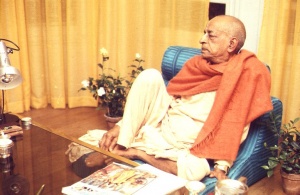CC Adi 17.272 (1975): Difference between revisions
(Vanibot #0027: CCMirror - Mirror CC's 1996 edition to form a basis for 1975) |
(Vanibot #0020: VersionCompareLinker - added a link to the Version Compare feature) |
||
| Line 2: | Line 2: | ||
<div style="float:left">'''[[Sri Caitanya-caritamrta (1975)|Śrī Caitanya-caritāmṛta (1975)]] - [[CC Adi (1975)|Ādi-līlā]] - [[CC Adi 17 (1975)|Chapter 17: The Pastimes of Lord Caitanya Mahāprabhu in His Youth]]'''</div> | <div style="float:left">'''[[Sri Caitanya-caritamrta (1975)|Śrī Caitanya-caritāmṛta (1975)]] - [[CC Adi (1975)|Ādi-līlā]] - [[CC Adi 17 (1975)|Chapter 17: The Pastimes of Lord Caitanya Mahāprabhu in His Youth]]'''</div> | ||
<div style="float:right">[[File:Go-previous.png|link=CC Adi 17.271 (1975)|Ādi-līlā 17.271]] '''[[CC Adi 17.271 (1975)|Ādi-līlā 17.271]] - [[CC Adi 17.273 (1975)|Ādi-līlā 17.273]]''' [[File:Go-next.png|link=CC Adi 17.273 (1975)|Ādi-līlā 17.273]]</div> | <div style="float:right">[[File:Go-previous.png|link=CC Adi 17.271 (1975)|Ādi-līlā 17.271]] '''[[CC Adi 17.271 (1975)|Ādi-līlā 17.271]] - [[CC Adi 17.273 (1975)|Ādi-līlā 17.273]]''' [[File:Go-next.png|link=CC Adi 17.273 (1975)|Ādi-līlā 17.273]]</div> | ||
{{CompareVersions|CC|Adi 17.272|CC 1975|CC 1996}} | |||
{{RandomImage}} | {{RandomImage}} | ||
==== TEXT 272 ==== | ==== TEXT 272 ==== | ||
<div class="verse"> | <div class="verse"> | ||
:eta | :eta bali' bhāratī gosāñi kāṭoyāte gelā | ||
:mahāprabhu tāhā | :mahāprabhu tāhā yāi' sannyāsa karilā | ||
</div> | </div> | ||
| Line 18: | Line 17: | ||
<div class="synonyms"> | <div class="synonyms"> | ||
eta | eta bali'-saying this; bhāratī—Keśava Bhāratī; gosāñi—the spiritual master; kāṭoyāte—to Katwa; gelā—went; mahāprabhu—Lord Caitanya Mahāprabhu; tahā—there; yai'-going; sannyāsa—the renounced order of life; karilā—accepted. | ||
</div> | </div> | ||
| Line 34: | Line 33: | ||
At the end of His twenty-fourth year, at the end of the fortnight of the waxing moon, Śrī Caitanya Mahāprabhu left Navadvīpa and crossed the river Ganges at a place known as Nidayāra-ghāṭa. Then He reached Kaṇṭaka-nagara, or Kāṭoyā (Katwa), where He accepted ekadaṇḍa-sannyāsa according to the Śaṅkarite system. Since Keśava Bhāratī belonged to the Śaṅkarite sect, he could not initiate Caitanya Mahāprabhu into the Vaiṣṇava sannyāsa order, whose members carry the tridaṇḍa. | At the end of His twenty-fourth year, at the end of the fortnight of the waxing moon, Śrī Caitanya Mahāprabhu left Navadvīpa and crossed the river Ganges at a place known as Nidayāra-ghāṭa. Then He reached Kaṇṭaka-nagara, or Kāṭoyā (Katwa), where He accepted ekadaṇḍa-sannyāsa according to the Śaṅkarite system. Since Keśava Bhāratī belonged to the Śaṅkarite sect, he could not initiate Caitanya Mahāprabhu into the Vaiṣṇava sannyāsa order, whose members carry the tridaṇḍa. | ||
Candraśekhara Ācārya assisted in the routine ceremonial work of the | Candraśekhara Ācārya assisted in the routine ceremonial work of the Lord's acceptance of sannyāsa. By the order of Śrī Caitanya Mahāprabhu, kīrtana was performed for the entire day, and at the end of the day the Lord shaved off His hair. On the next day He became a regular sannyāsī, with one rod (ekadaṇḍa). From that day on His name was Śrī Kṛṣṇa Caitanya. Before that, He was known as Nimāi Paṇḍita. Śrī Caitanya Mahāprabhu, in the sannyāsa order, traveled all over Rāḍha-deśa, the region where the Ganges River cannot be seen. Keśava Bhāratī accompanied Him for some distance. | ||
</div> | </div> | ||
Latest revision as of 16:27, 26 January 2020

A.C. Bhaktivedanta Swami Prabhupada
TEXT 272
- eta bali' bhāratī gosāñi kāṭoyāte gelā
- mahāprabhu tāhā yāi' sannyāsa karilā
SYNONYMS
eta bali'-saying this; bhāratī—Keśava Bhāratī; gosāñi—the spiritual master; kāṭoyāte—to Katwa; gelā—went; mahāprabhu—Lord Caitanya Mahāprabhu; tahā—there; yai'-going; sannyāsa—the renounced order of life; karilā—accepted.
TRANSLATION
After saying this, Keśava Bhāratī, the spiritual master, went back to his village, Katwa. Lord Caitanya Mahāprabhu went there and accepted the renounced order of life [sannyāsa].
PURPORT
At the end of His twenty-fourth year, at the end of the fortnight of the waxing moon, Śrī Caitanya Mahāprabhu left Navadvīpa and crossed the river Ganges at a place known as Nidayāra-ghāṭa. Then He reached Kaṇṭaka-nagara, or Kāṭoyā (Katwa), where He accepted ekadaṇḍa-sannyāsa according to the Śaṅkarite system. Since Keśava Bhāratī belonged to the Śaṅkarite sect, he could not initiate Caitanya Mahāprabhu into the Vaiṣṇava sannyāsa order, whose members carry the tridaṇḍa.
Candraśekhara Ācārya assisted in the routine ceremonial work of the Lord's acceptance of sannyāsa. By the order of Śrī Caitanya Mahāprabhu, kīrtana was performed for the entire day, and at the end of the day the Lord shaved off His hair. On the next day He became a regular sannyāsī, with one rod (ekadaṇḍa). From that day on His name was Śrī Kṛṣṇa Caitanya. Before that, He was known as Nimāi Paṇḍita. Śrī Caitanya Mahāprabhu, in the sannyāsa order, traveled all over Rāḍha-deśa, the region where the Ganges River cannot be seen. Keśava Bhāratī accompanied Him for some distance.